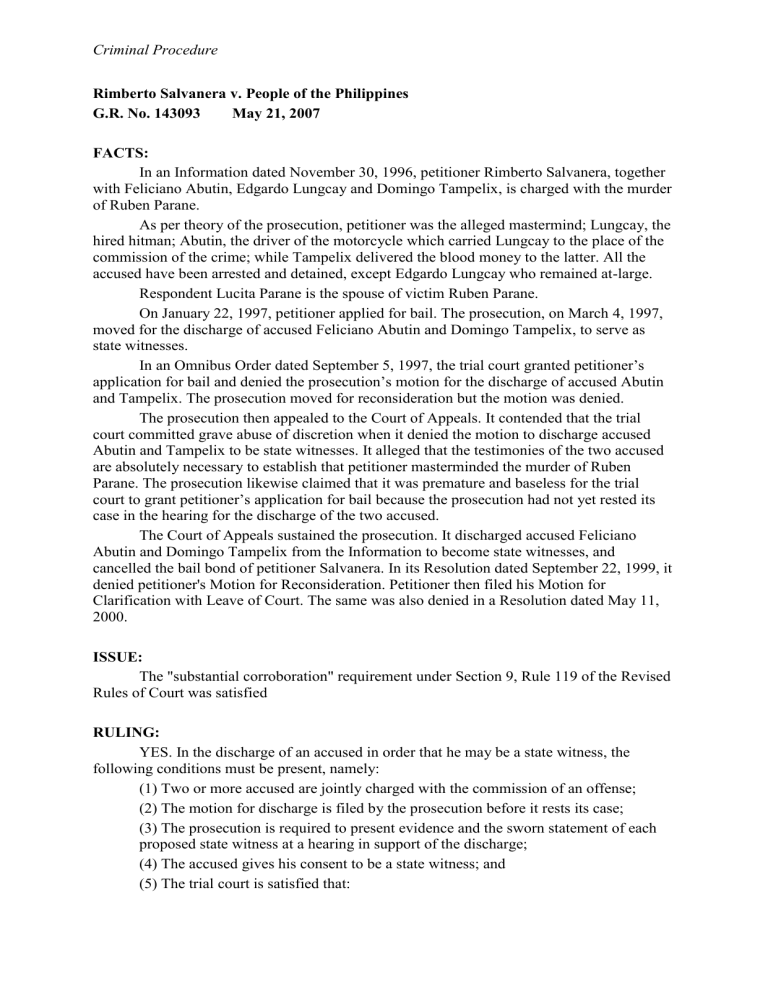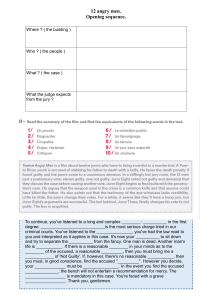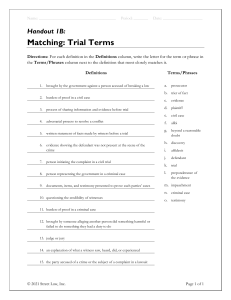
Criminal Procedure Rimberto Salvanera v. People of the Philippines G.R. No. 143093 May 21, 2007 FACTS: In an Information dated November 30, 1996, petitioner Rimberto Salvanera, together with Feliciano Abutin, Edgardo Lungcay and Domingo Tampelix, is charged with the murder of Ruben Parane. As per theory of the prosecution, petitioner was the alleged mastermind; Lungcay, the hired hitman; Abutin, the driver of the motorcycle which carried Lungcay to the place of the commission of the crime; while Tampelix delivered the blood money to the latter. All the accused have been arrested and detained, except Edgardo Lungcay who remained at-large. Respondent Lucita Parane is the spouse of victim Ruben Parane. On January 22, 1997, petitioner applied for bail. The prosecution, on March 4, 1997, moved for the discharge of accused Feliciano Abutin and Domingo Tampelix, to serve as state witnesses. In an Omnibus Order dated September 5, 1997, the trial court granted petitioner’s application for bail and denied the prosecution’s motion for the discharge of accused Abutin and Tampelix. The prosecution moved for reconsideration but the motion was denied. The prosecution then appealed to the Court of Appeals. It contended that the trial court committed grave abuse of discretion when it denied the motion to discharge accused Abutin and Tampelix to be state witnesses. It alleged that the testimonies of the two accused are absolutely necessary to establish that petitioner masterminded the murder of Ruben Parane. The prosecution likewise claimed that it was premature and baseless for the trial court to grant petitioner’s application for bail because the prosecution had not yet rested its case in the hearing for the discharge of the two accused. The Court of Appeals sustained the prosecution. It discharged accused Feliciano Abutin and Domingo Tampelix from the Information to become state witnesses, and cancelled the bail bond of petitioner Salvanera. In its Resolution dated September 22, 1999, it denied petitioner's Motion for Reconsideration. Petitioner then filed his Motion for Clarification with Leave of Court. The same was also denied in a Resolution dated May 11, 2000. ISSUE: The "substantial corroboration" requirement under Section 9, Rule 119 of the Revised Rules of Court was satisfied RULING: YES. In the discharge of an accused in order that he may be a state witness, the following conditions must be present, namely: (1) Two or more accused are jointly charged with the commission of an offense; (2) The motion for discharge is filed by the prosecution before it rests its case; (3) The prosecution is required to present evidence and the sworn statement of each proposed state witness at a hearing in support of the discharge; (4) The accused gives his consent to be a state witness; and (5) The trial court is satisfied that: Criminal Procedure a) There is absolute necessity for the testimony of the accused whose discharge is requested; b) There is no other direct evidence available for the proper prosecution of the offense committed, except the testimony of said accused; c) The testimony of said accused can be substantially corroborated in its material points; d) Said accused does not appear to be the most guilty; and, e) Said accused has not at any time been convicted of any offense involving moral turpitude. According to petitioner, the testimony of an accused sought to be discharged to become a state witness must be substantially corroborated, not by a co-accused likewise sought to be discharged, but by other prosecution witnesses who are not the accused in the same criminal case. Petitioner justifies this theory on the general principles of justice and sound logic. He contends that it is a notorious fact in human nature that a culprit, confessing a crime, is likely to put the blame on others, if by doing so, he will be freed from any criminal responsibility. Thus, in the instant case, petitioner supposes that both Abutin and Tampelix will naturally seize the opportunity to be absolved of any liability by putting the blame on one of their co-accused. Petitioner argues that prosecution witnesses Parane and Salazar, who are not accused, do not have personal knowledge of the circumstances surrounding the alleged conspiracy. Thus, they could not testify to corroborate the statement of Abutin and Tampelix that petitioner is the mastermind or the principal by induction. We agree with the Court of Appeals in dismissing this reasoning as specious. To require the two witnesses Parane and Salazar to corroborate the testimony of Abutin and Tampelix on the exact same points is to render nugatory the other requisite that "there must be no other direct evidence available for the proper prosecution of the offense committed, except the testimony of the state witness." The corroborative evidence required by the Rules does not have to consist of the very same evidence as will be testified on by the proposed state witnesses. We have ruled that "a conspiracy is more readily proved by the acts of a fellow criminal than by any other method. If it is shown that the statements of the conspirator are corroborated by other evidence, then we have convincing proof of veracity. Even if the confirmatory testimony only applies to some particulars, we can properly infer that the witness has told the truth in other respects." It is enough that the testimony of a coconspirator is corroborated by some other witness or evidence. In the case at bar, we are satisfied from a reading of the records that the testimonies of Abutin and Tampelix are corroborated on important points by each other’s testimonies and the circumstances disclosed through the testimonies of the other prosecution witnesses, and "to such extent that their trustworthiness becomes manifest." As part of the conspiracy, Abutin and Tampelix can testify on the criminal plan of the conspirators. Where a crime is contrived in secret, the discharge of one of the conspirators is essential because only they have knowledge of the crime. The other prosecution witnesses are not eyewitnesses to the crime, as, in fact, there is none. No one except the conspirators knew and witnessed the murder. The testimonies of the accused and proposed state witnesses Abutin and Tampelix can directly link petitioner to the commission of the crime.



